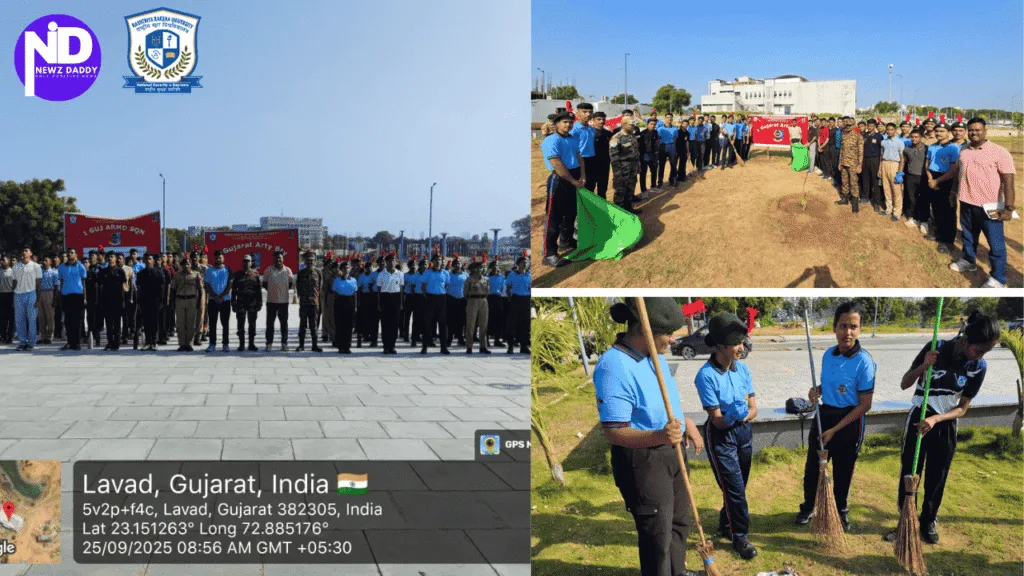Swachhta Abhiyan Leads Cadets To Clean RRU Campus
Newz Daddy Educational Updates
Under the guidance of Commanding Officer Lt. Col. T.G. Rajesh, the 1 Gujarat Artillery Battery, NCC Unit at Rashtriya Raksha University, organised a two-hour Swachhta Abhiyan on campus today.
The NCC (National Cadet Corps) is India’s youth development organisation. It often leads such cleanliness drives as part of national campaigns. NCC units across India regularly take part in Swachh Bharat or Swachhta Abhiyan events to instil civic sense in cadets.
The cleanliness drive was conducted with the active participation of 128 NCC cadets. Such high participation shows strong commitment. In many colleges and schools, even 50–100 cadets join similar events, so 128 is quite a solid number. The large number also helps cover more ground physically, cleaning pathways, gardens, public spots, and waste bins.
The initiative was led by ANO and the Director, School of NCC and Police Martial Music Band, Lt. (Dr.) Gaurav Singh Kushwah, along with CTO Yash Sharma. Having a senior officer and instructors lead from the front adds authority and motivation. The NCC@RRU webpage mentions that the NCC wing at RRU tries to promote leadership, discipline, and social service among cadets.
They were supported by Parade Instructors Havildar Prabir Das and Havildar A. Srinivasulu. Parade Instructors generally train cadets in drills, discipline, and coordination. Their presence ensures the cadets work in an organised manner, follow lines, and manage zones properly.
The cadets and staff have set a shining example of Selfless Service and Civic Responsibility. Swachhta Abhiyan is aligned with the national Swachh Bharat Mission, which aims for a clean India and zero open defecation.
When youth (cadets) lead such drives, it encourages local community members and students on campus to join future efforts.
During this event, cadets likely cleaned areas such as campus roads, gardens, litter zones, bins, and maybe common halls and washrooms. Many Swachhta drives also include waste segregation—separating plastic, bio-waste, and paper. While not stated in your text, such practices are common in NCC drives.
Swachhta Abhiyan is often run as part of “Swachhta Pakhwada” or fortnight campaigns across India. These missions encourage institutions, schools, colleges, offices, and local communities to do cleaning work and awareness drives in September–October. The NCC web pages at RRU show that the NCC unit is active in community service, discipline, adventure training, and nation-building.
Such drives also help in developing civic sense among young cadets: they learn that cleaning public spaces is everyone’s responsibility, not just municipal workers’. When students, staff, and cadets see areas cleaned, they are more likely to keep them clean later. At RRU, this kind of activity also builds the university’s image as socially responsible. It gives real meaning to the university’s mission of training for security, law, policing, and public service, beyond just academics.
Given that RRU is under the Ministry of Home Affairs and is an institute focused on security and policing education, its cadets doing a cleanliness drive shows that even security-trained youth care about public health and hygiene. When the cadets worked for two hours, they might also have paused for a short break, taken a hydration break, and organised the collected waste. In many drives, the collected trash is weighed or reported to authorities, so there is accountability and measurement.
The presence of officers like Lt. Col. T.G. Rajesh and instructors ensures discipline, timing, and proper deployment of cadets across campus zones. Leadership presence also encourages higher standards of work. After the drive, usually, a short speech or motivational message is given, thanking cadets, instructing them to continue such work, and reminding them why cleanliness matters. While your text doesn’t mention a speech, that is common practice in these events.
Finally, such Swachhta Abhiyans help in bridging the gap between the campus and the local community. Sometimes neighbouring villagers, nearby residents or staff also watch or join. The event also sends a message that security institutions care about the environment and the community.
Must Read:
Mizoram Entrepreneurship Development Institute Brings Hope And Growth

